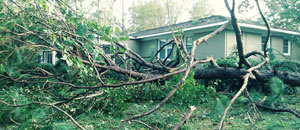ALPHARETTA, Ga.—Southern Baptists are poised to respond after Hurricane Michael made landfall with sustained wind speeds just two miles per hour short of a Category 5 storm on Oct. 10.
The storm took a direct shot to the Florida Panhandle near Mexico Beach, Fla. And it was the third strongest in recorded United States history, the strongest to hit the Continental U.S. in 14 years and the strongest ever to hit the Panhandle. Panama City, Fla., Mexico Beach and several towns in between have been decimated as they endured the brunt of Michael’s punch.
Linda Albrecht, a Mexico Beach Councilwoman, told CNN.com, “It feels like a nightmare.” More than 350,000 lost power in Florida.
Baptists have identified potential locations that will host feeding and recovery teams in Florida: Tallahassee, Lynn Haven, Perry, Crawfordville and Spring Hill.
“The damage in 12 county areas has been devastating,” said Delton Beall, state director of Florida Baptist Disaster Relief. “Bay County has received the brunt of it. We are planning and staging a response, but Florida is still in a search and rescue phase. We continue to ask for Southern Baptists’ prayers.”

Ken Cloud
Many South Georgia Baptists were reeling Oct. 11 after Hurricane Michael tore through the Florida Panhandle and through the heart of Georgia last Wednesday, the Christian Index reported.
Search and rescue teams were going door-to-door in the hardest hit counties, and Southern Baptist Disaster Relief teams will not be allowed in until that process is complete.
The North American Mission Board provides national coordination and assistance in larger, multi-state responses for SBDR. NAMB president Kevin Ezell encouraged Southern Baptists to pray and prepare to serve in whatever way they can.
“I have told our Baptist leaders in Florida and Georgia that NAMB is here to support them and provide whatever they need,” Ezell said. “Hurricane Michael became an historic storm almost overnight. The survivors will need every prayer, dollar and helping hand that we can send them. Southern Baptists, we have an opportunity to send help, healing and the hope of the Gospel to people who have lost everything.”
After pulverizing Florida, Hurricane Michael continued across the Southeast at hurricane strength through the night Wednesday until it reached Browndale, Ga., covering roughly 230 miles from where the storm made landfall with gale-force winds and several inches of rain.
Marshall Shepherd, director of the University of Georgia’s atmospheric sciences program and former president of the American Meteorological Society, called Hurricane Michael “a life-altering, society-altering situation,” according to The Verge.
“Storms of this magnitude and impact, the name is typically retired,” he said. “And I fully expect this to be the case for Michael.”
In Alabama and Georgia, around 150,000 residents were without power Thursday. SBDR teams in those states have identified potential locations in Dothan, Ala., Bainbridge, Ga., Donalsonville, Ga., and Albany, Ga.
American Red Cross has asked SBDR to prepare to serve up to 30,000 meals a day. SBDR teams reported more than 2,000 volunteers are ready to go and serve with recovery and feeding units. Sixteen SBDR kitchens from 11 different Baptist state disaster relief teams are available. Those kitchens have the capacity to serve more than 200,000 meals per day if needed.
South Carolina and North Carolina, still recovering from Hurricane Florence, will see Michael roll through as a tropical storm from Thursday to Friday.
“Southern Baptists will send several hundred volunteers to serve those who have been ravaged by Hurricane Michael,” said Sam Porter, national director for disaster relief with NAMB. “Hundreds of volunteers will continue to serve people in the Carolinas and across the nation who have been affected by disasters.”
David Melber, the president of Send Relief, which is NAMB’s compassion ministry arm, thanked Southern Baptists for their persistent disaster relief service, and urged SBDR volunteers to make plans to serve in the coming weeks and months.
“Hurricane Michael caused so much damage that people will need storm recovery help for the foreseeable future,” Melber said. “If volunteers are unable to serve in the immediate aftermath, the people of Georgia and Florida will still need assistance several weeks from now. I encourage you to make plans to be there.” (BP)
Brandon Elrod